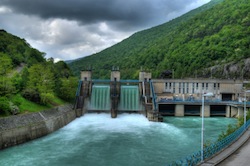According to the latest issue of the U.S. Energy Information Administration’s (EIA) “Electric Power Monthly” renewable energy sources provided 14.20 percent of the country’s net electric generation during the first half of the year (through June 30, 2013). During the same period in 2012, renewables accounted for 13.57 percent of net electrical generation.
 In addition, the report found that non-hydro renewables have more than tripled their output during the past decade. They now account for almost the same share of electrical generation (6.71%) as does conventional hydropower (7.49%). Ten years ago (i.e., calendar year 2003), non-hydro renewables provided only 2.05% of net U.S. electrical generation.
In addition, the report found that non-hydro renewables have more than tripled their output during the past decade. They now account for almost the same share of electrical generation (6.71%) as does conventional hydropower (7.49%). Ten years ago (i.e., calendar year 2003), non-hydro renewables provided only 2.05% of net U.S. electrical generation.
Comparing the first six months of 2013 to the same period in 2012, solar thermal and photovoltaic (PV) combined have grown 94.4 percent while wind increased 20.1 percent and geothermal grew by 1.0 percent. Biomass declined by 0.5 percent while hydropower dropped by 2.6 percent. Among the non-hydro renewabes, wind is in the lead, accounting for 4.67 percent of net electrical generation, followed by biomass (1.42%), geothermal (0.43%), and solar (0.19%).
The balance of the nation’s electrical generation mix for the first half of 2013 consisted of coal (39.00% – up by 10.3%), natural gas and other gas (26.46% – down by 13.6%), nuclear power (19.48% – up by 0.2%), and petroleum liquids + coke (0.66% – up by 15.6%). The balance (0.21%) was from other sources and pumped hydro storage.
“Every year for the past decade, non-hydro renewables have increased both their net electrical output as well as their percentage share of the nation’s electricity mix,” said Ken Bossong, Executive Director of the SUN DAY Campaign. “Moreover, the annual rate of growth for solar and wind continues in the double digits, setting new records each year.”

